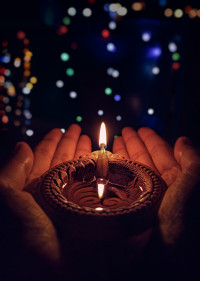As it is
With incessant rain, memories flood in
For months people line up for water, but at this time of year we just want respite from the endless problems monsoon brings.
Mohan Guragain
Since Vedic times, people have worshipped water as a form of god. Even for nonbelievers, water inspires awe and wonder. For the thirsty throat, fistfuls of spring water are heavenly. The mystical music of a waterfall is blissful, the calm of the mighty Arun divine. Salty or fresh, water is abundant, but what causes trouble is its distribution.
For months, freshwater remains scarce in our country, causing long lines of vessels before a source. At other times, water is everywhere—like in the Tarai now when all you see is water everywhere. Mighty waters whose depth will swallow you, angry waters whose currents will sweep your roads and houses. It saturates soil so much that you may be bogged down.
Just before incessant rains swept ways and houses in the hills in the past few days, weeks of drought had afflicted the maize crop beyond revival. In eastern Tarai, flooded fields have swept away freshly planted paddy ones right now. Nearly 80 percent of the plains in Province 2 were flooded or inundated in the past week, leaving people with no space to even stand on. People have been without clean water and food, as aid has yet to reach. When the water recedes eventually, the swathes of land will become a breeding ground for diseases.
In safe hill towns and elevated areas in the Kathmandu Valley, prolonged precipitation may not be so frustrating. My own experience of the overwhelming downpour was as a child in the eastern hills. By any measure, a week of continuous rain is severe. On one such occasion three decades ago, rainfall had left no spot hard in Terhathum villages. Land felt squelchy wherever I walked. The earth had seeped so much water that drops appeared through the walls of houses, terraces of fields were flooded. It seemed that sources of water had sprung everywhere, but only a few of them lasted. We cut papaya leaf stalks and set up fountains in the corners of the muddy courtyard.
The ubiquitous mud made mobility hard—harder if you had to carry loads. Mud ate the skin between toes and made them sore and itchy. Sleeping would be difficult without treatment. And medicine was not easily available in remote villages. So the common cure was raw pomegranate grilled whole in glowing firewood. The baked pulp was oozed out and applied on sore feet, especially in between the toes or wherever it itched. The acidic substance would cause a burning sensation, but it would do wonders when left overnight.
I’ve never seen landslides as devastating as then. We could hear exploding sounds as cliffs broke off and crashed into gorges. We could actually see land sliding down on faraway slopes, taking with it trees and rock boulders. Some trees and bamboo groves would still be left standing, albeit removed from where they stood.
So much of our farm field crumbled. Our homestead was saved only by a whisker. The week-long rain had swept nearly half of our paddy fields. Even the ground below our house began to crack and fall. When the disaster aggravated, our family sought divine intervention. Our clan’s dhami, the witch doctor, uttered in his spirited stupor that a couple of deities were left unexplored in our vicinity.
Soon afterwards, a group of dhamis engaged in a thrilling spell, shaking vigorously, chanting mantras, beating drums and eating burning coal—all to a carnivalesque atmosphere, well past midnight. This left us, children, both thrilled and shaken. Then their vigorous search began in different directions near our well. One of them found a stone to the east of the twin wells while another dug out a heavy smooth dark triangular rock with trident and teeth from under bamboo roots.
The next morning, the deities were installed in a temple. Coincidentally, the landslides stopped completely on our fields. Neighbours said that our field, house and huts would have gone had the deities not been recognised and appeased. I believed that too for years. I suspected only later that a line of trees that remained probably stopped the disaster as the rains receded gradually.
A hill dweller, it took me time to adjust to the Tarai. It was in summer when I first descended to the plains. In the sweltering heat, I did not like the taste of anything I ate. Even in perspiration, smelly tubewell water did not readily go down my throat. Life was all about paddy plantation—it was watery fields everywhere—and even roads were not free of mud and water. Compared to the hillside, the horizon was narrow, literally. No wonder, I preferred Dhankuta to Bhadrapur for college.
I preferred taking cattle out to the pastures in the hills, risking falling stones hitting you or the slippery land sliding beneath your feet. I missed the wild jamuns and mangoes that made delicious bites, earned dearly with precarious slippery climbs. Grassy slopes required one to set foot carefully as stones sticking out came off easily. Most unforgettable was the sweet corn, grilled in a raging log fire—except sometimes we ate nothing else for dinner for several days.
Today I see the havoc that’s been inflicted in the Tarai, and memories flood in. I can imagine how hard it must be now for people to put up with the devastated central Tarai—when one is cornered by floodwater and mud; when there is no food, clean water, clothes or medicines. Worst, when there is no hope—when even their homes have been submerged. Life can’t sustain if help does not arrive on time.
What do you think?
Dear reader, we’d like to hear from you. We regularly publish letters to the editor on contemporary issues or direct responses to something the Post has recently published. Please send your letters to [email protected] with "Letter to the Editor" in the subject line. Please include your name, location, and a contact address so one of our editors can reach out to you.




 14.24°C Kathmandu
14.24°C Kathmandu










